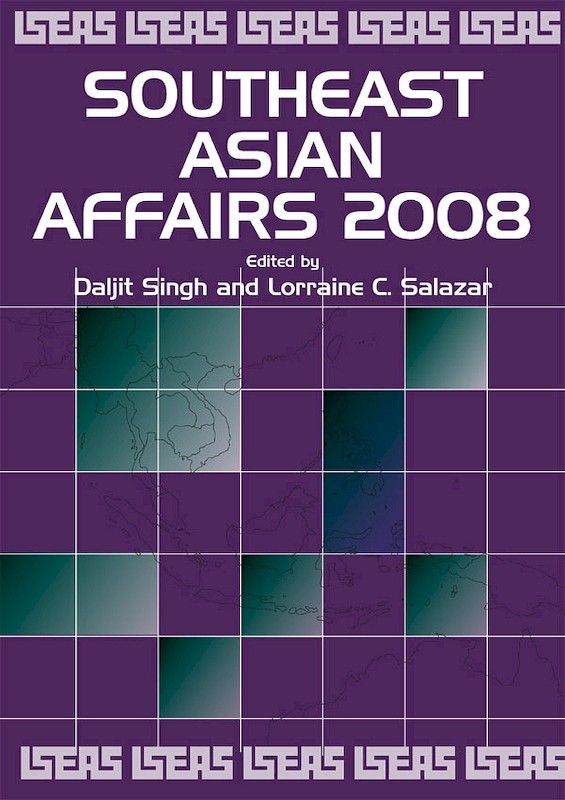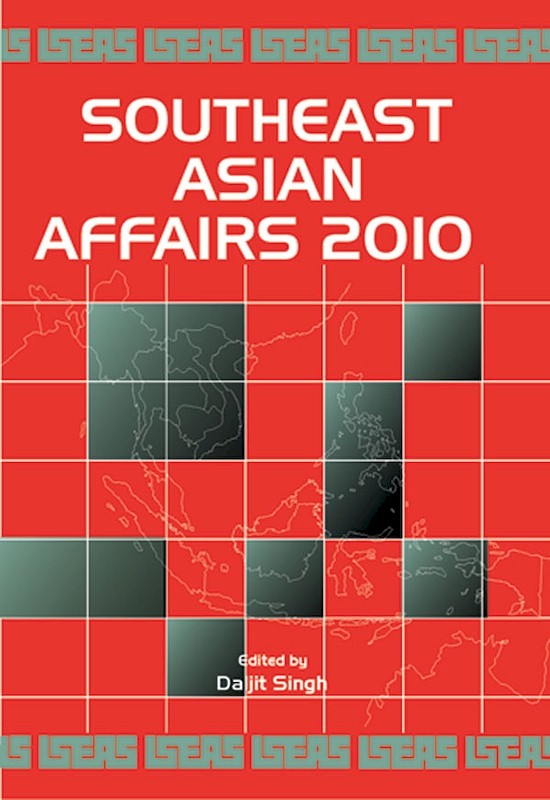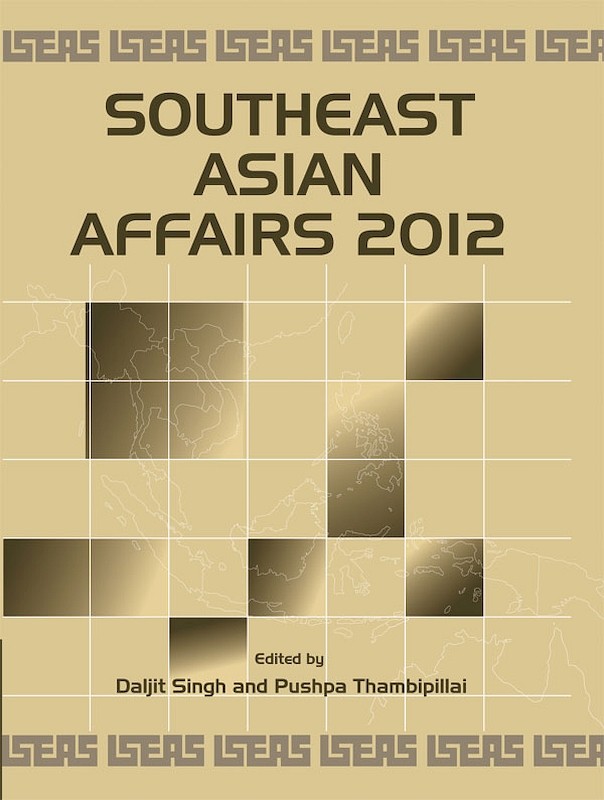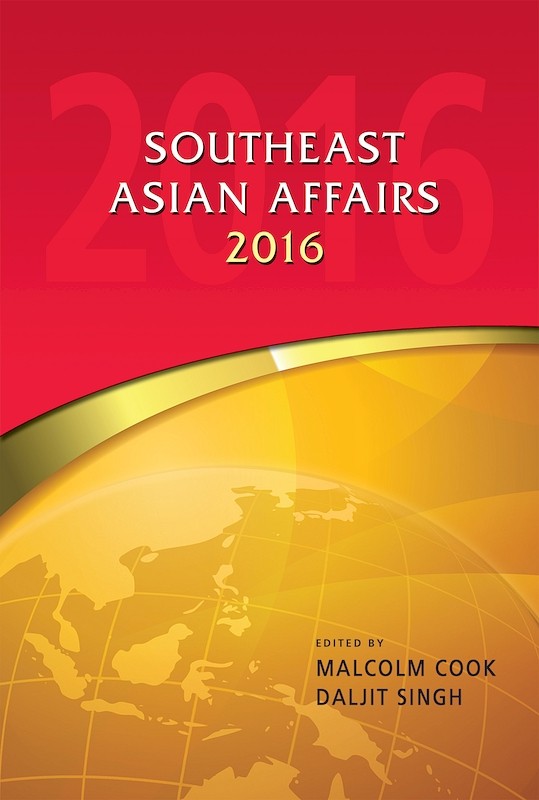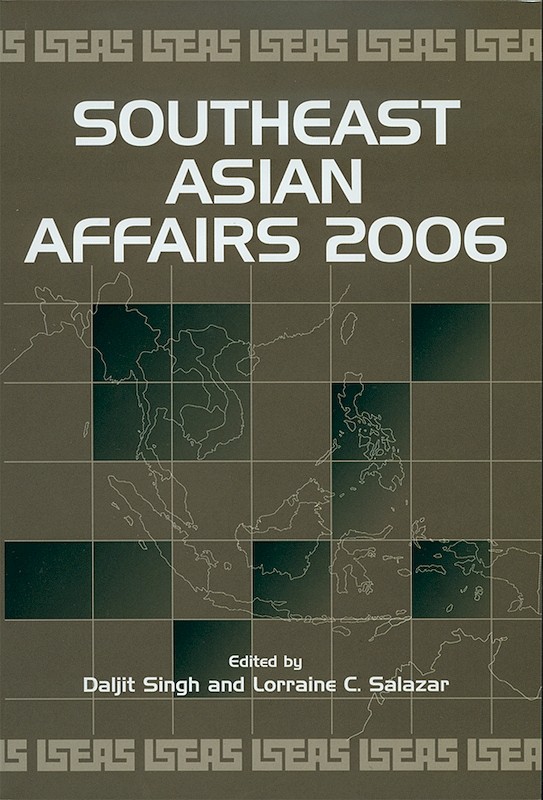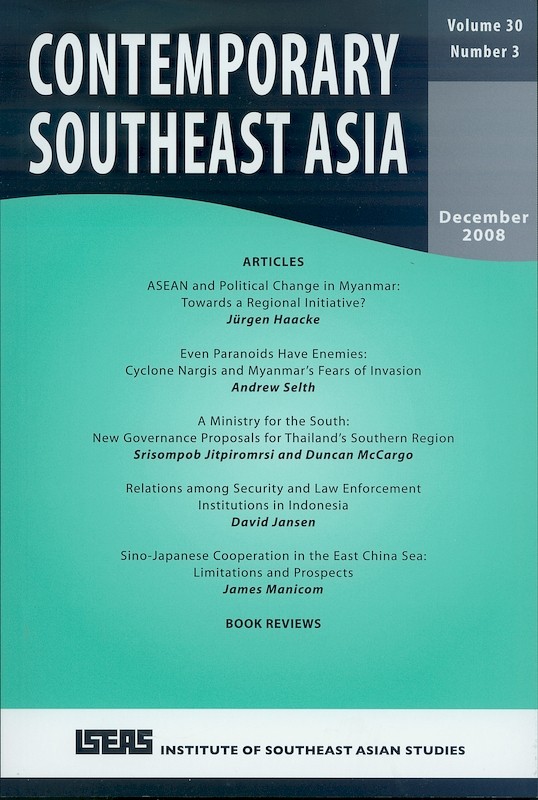Southeast Asian Affairs 2009
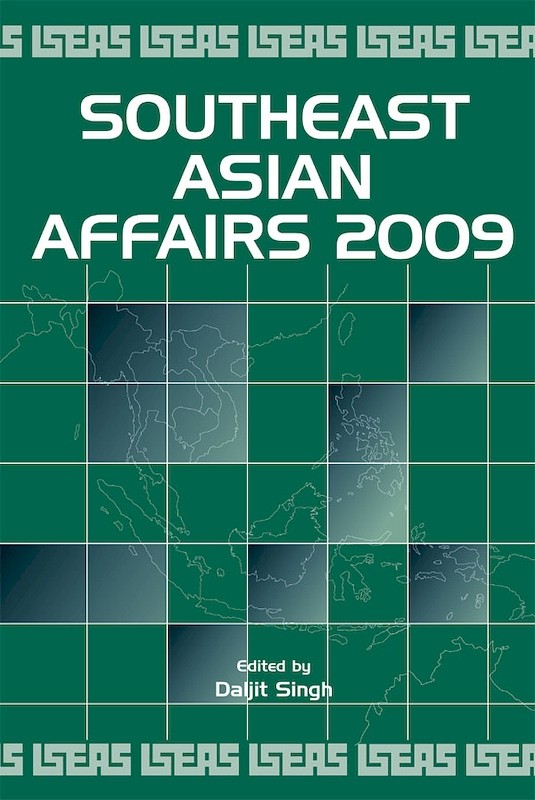
Reviews
"The annual series of Southeast Asian Affairs has been the flagship publication of the Institute of Southeast Asian Studies (ISEAS) in Singapore since its inception in 1974. For 35 years, the aim has been to provide an authoritative guide to economic, social, political and strategic issues in the 10 very diverse nations that comprise the Association of Southeast Asian Nations (ASEAN). The past 35 years have witnessed many changes in South East Asia, which successive volumes of Southeast Asian Affairs have documented and analysed. All the chapters are clearly written and informative; the language is for the most part non-technical and should be accessible to a wide audience outside the world of universities and specialist research institutes. The message one takes from this volume is that, in spite of much progress over the last three decades, the 10 ASEAN countries still face a range of economic and political problems that will probably worsen as a result of the current global recession. Future editions of this valuable publication will no doubt continue to illuminate the issues both for existing students of South East Asia and for newcomers to the study of an endlessly fascinating part of the world" (South East Asia Research).
About the publication
Southeast Asian Affairs 2009 provides an informed and readable analysis of events and developments in the region in 2008. In the regional section of the volume, the first two articles give the political and economic overview of Southeast Asia, the third discusses the use of mediation as a means for conflict resolution, while the fourth examines regional cooperation in maritime security arena. Eleven country reviews as well as well as six special theme articles follow, covering political, economic, security and social developments in the various countries and their implications for the region.
Contents
-
Southeast Asian Affairs 2009
[Whole Publication] -
Preliminary pages
- THE REGION
-
Southeast Asia in 2008: Challenges WIthin and Without, by Catharin Dalpino, author see abstractThe ratification of the ASEAN Charter in 2008 established the Association as a legal entity but raised numerous questions about the eventual shape and function of the group. A human rights body is to be established in 2009 but member nations are not clear on its mandate; disagreements on this issue reflect the broadening political spectrum in Southeast Asia. ASEAN's legal framework will also influence its economic integration, and this issue has become more urgent as the Association works toward deadlines for tariff reduction in a worsening global economic climate. Bilateral conflicts among ASEAN members in 2008 offered both alarm and reassurance: Thailand and Cambodia came to blows briefly in a border dispute over the Preah Vihear temple, while Singapore and Malaysia settled three longstanding maritime disputes through the International Court of Justice. ASEAN continued to play a larger role in the Asia-Pacific region in 2008, but there were indications that dynamics within the ASEAN-Plus-Three are changing, and that the Northeast Asian members may no longer require ASEAN as a convening force.
-
ASEAN Economies: Challenges and Responses Amid the Crisis, by Aladdin D Rillo, author see abstractAlladin D. Rillo surveys the impact of the global crisis on the ASEAN economies and the challenges posed, including the need to implement policies that create a domestically sourced growth, to manage capital flows in an environment of increased market volatility and to continue with restructuring efforts both nationally and regionally. Rillo also suggests how the ASEAN region should respond to these challenges.
-
Managing Armed Conflict in Southeast Asia: The Role of Mediation, by Michael Vatikiotis, author see abstractThe management of armed conflicts in Southeast Asia has been partially successful but, with the notable exception of Aceh, resolution in terms of reaching agreements that permanently end hostilities while also addressing the grievances which gave rise to hostilities in the first place has been rare. Arguing that third party mediation can help to mitigate or settle conflicts, Michael Vatikiotis examines the challenges that such mediation faces in the region and suggests certain approaches to deal with them.
-
Maritime Security in Southeast Asia: Two Cheers for Regional Cooperation, by Ian Storey, author
- BRUNEI DARUSSALAM
-
Brunei Darussalam: Cautious on Political Reform, Comfortable in ASEAN, Pushing for Economic Diversification, by Christopher Roberts, Lee Poh Onn, authors see abstract2008 represented a very successful year for Brunei's international relations thanks to progress in the resolution of territorial disputes with Malaysia and the continued strengthening of relations with other countries including Singapore, Britain, Australia and the United States. While the Sultanate demonstrated a more cautious approach to domestic political reform, performance legitimacy has largely been maintained thanks to the significant economic and social welfare benefits provided by the Sultan. Despite the high living standards enjoyed by the country, drug abuse and general crime has become increasingly problematic. On the economic front, by the close of 2008 Brunei's economy fell into negative growth as a consequence of the global credit crunch and a subsequent fall in the price of the Sultanate's oil and gas exports. Nevertheless, Brunei's policy of economic diversification has started to bear fruit with significant growth in both the private and public sectors.
- CAMBODIA
-
Cambodia: The Cambodian People's Party Consolidates Power, by Carlyle A. Thayer, author see abstractIn July 2008, the Cambodian People's Party (CPP) won a landslide victory in the country's fourth general election since 1993. The electoral process was flawed and irregularities gave the CPP an unfair advantage over its rivals. The CPP's victory was also due to the popularity of Prime Minister Hun Sen and disarray among the opposition. The CPP's commanding majority lead to fears that needed reforms would be sidetracked, the opposition marginalized and liberal democracy eroded. Hun Sen's government faced major challenges on three fronts: a border dispute with Thailand over land surrounding Preah Vihear temple; high inflation and declining economic growth rates; and international impatience over the slow pace of the Khmer Rouge Tribunal due to corruption and disagreement by co-prosecutors. The CPP government was bolstered by continued political support from Vietnam and Chinese investment and "no strings" economic assistance. The United States reversed past policy and began to engage with Cambodia politically.
- INDONESIA
-
Indonesia in 2008: Democratic Consolidation in Soeharto's Shadow, by Marcus Mietzner, author see abstractIndonesia's political and socio-economic developments in 2008 were marked by two contradictory trends. On the one hand, the process of democratic consolidation continued, with Indonesia further strengthening its political institutions, making progress in its anti-corruption drive and generally maintaining healthy economic growth. However, Indonesia's democratic consolidation was also challenged by a very divergent phenomenon: that is, the increasing proliferation of some form of nostalgia for the effectiveness of Soeharto's New Order. Significantly, the year 2008 not only witnessed Soeharto's death, but also the tenth anniversary of the democratic regime change. Using both occasions to reflect on Soeharto's achievements, many Indonesians concluded that his regime had been superior to the existing polity in several important aspects. This chapter aims to take account of both the remarkable stabilization of Indonesian democracy and the latent support in society for Soeharto's authoritative leadership. However, I will argue that despite continuous criticisms of the incumbent multi-party system, Indonesia's democracy in 2008 was more stable than at any other point in its history.
-
Legacies of History, Present Challenges, and the Future, by Jusuf Wanandi , author see abstractIndonesia is a young country, established only in 1945. After a series of struggles, uprisings and economic crises, in 2009 we have reached political stability, economic sustainability and a maturing democracy. President Soekarno brought unity and national pride to the nation, but disregarded the economy and liked to have a permanent revolution, resulting in tensions that exploded in 1965. President Soeharto brought back economic order and development, and was a hero when he took over in 1967. But he overstayed and through KKN (corruption, collusion, and nepotism) undid his earlier achievements. He never prepared for his successor. Habibie was Soehartos crony of 25 years and was never trusted by the elite and the people. Gus Dur was not healthy and capricious. Megawati's capabilities were limited. SBY was indecisive and liked to please everybody. Indonesia faces many challenges in the future: continuing with economic reforms and consolidating a maturing democracy, but the country has a fighting chance because the people are willing to work for it.
- LAOS
-
Laos: The Chinese Connection, by Martin Stuart-Fox, author see abstractThis chapter argues that by boosting aid and investment, China is becoming increasingly influential in Laos. Beijing's primary goal, however, is to obtain access to Lao resources, rather than to displace Vietnam. Vietnam too is boosting investment, but Hanoi's principal concern is to maintain close party-to-party relations with the Lao People's Revolutionary Party. By comparison, Thailand and Western aid donors have little real influence. On the domestic front, popular anger is growing over increasing corruption, and is beginning to exert pressure for reform. Moreover, as the fruits of corruption are unevenly distributed, jealously is dividing Party members. The Lao prime minister is aware of what is happening and wants to reign in corruption. So do the Vietnamese, in order to preserve a strong and cohesive Lao ruling party. But if the Vietnamese are backing moderate reform in Laos, the Chinese are more ambivalent. One thing is certain, however: none of the envisaged reforms will advance democracy in Laos.
- MALAYSIA
-
Malaysia: Political Transformation and Intrigue in an Election Year, by Johan Saravanamuttu, author see abstractThe year 2008 will be remembered as a watershed for the forward trajectory of Malaysian democracy. This election year saw a refurbished coalition of oppositional political forces, the People's Pact (Pakatan Rakyat), deprive the ruling National Front (Barisan Nasional) coalition of its two-thirds majority of seats in Parliament. Even more significantly, four state governments fell, making it a total of five governments in Opposition hands. This development has created a de facto two-party system for a maturing Malaysian political system. The year also saw the denouement of a leadership crisis within the United Malays National Organization (UMNO) and the anticipated departure from the political stage in March 2009 of Prime Minister Abdullah Ahmad Badawi. Malaysia also faces a severe economic downturn which will invariably affect the fortunes of those in power. Thus, the political terrain remains fraught with pitfalls for premier-in-waiting Najib Abdul Razak while Opposition Leader, Anwar Ibrahim awaits another sodomy trial.
- MYANMAR
-
Myanmar in 2008: Weathering the Storm, by Tin Maung Maung Than, author see abstractHighlights for Myanmar in 2008 were the tropical Cyclone Nargis that struck former capital Yangon and the Ayeyarwady Delta and the constitutional referendum. Both events elicited strong emotional responses from the military government's detractors. In fact, the Nargis tragedy provoked a storm of protest and angry calls for humanitarian intervention over the manner of the government's response. Meanwhile, the timing of the referendum that was organized during the same month in which Nargis struck as well as the overwhelming (over 92 per cent) affirmative vote led to accusations of callousness and allegations of vote rigging. On the other hand, the need for massive relief and rehabilitation effort led to the involvement of the United Nations (UN) and ASEAN (Association of Southeast Asian Nations) in a tripartite arrangement with the Myanmar government. This, in turn, created some opportunity for the local civil society organizations (CSO), general public, and INGOs (international non-governmental organizations) to take part in the effort to help the victims of Nargis. Nevertheless, the apparent lack of progress in instituting liberal political reforms, the continued detention of opposition icon Daw Aung San Suu Kyi together with allegations of forced labour, ill-treatment of political prisoners, internal displacement, and religious persecution remained points of contention between the government and the opposition. The UN Secretary General's special advisor Professor Ibrahim Gambari also failed to bring about a rapprochement between the protagonists. On the economic front, exports increased, buoyed by natural gas sales, registering a huge trade surplus and increasing the foreign exchange reserves to an all time high. Despite Western economic sanctions a substantial amount of investment pledges were secured. However, the domestic economy appeared to have slowed down though the full impact of the global economic crisis had yet to manifest in Myanmar whose exposure to the global economy was perhaps the least among the ten ASEAN economies.
-
The War on Drugs, by Paul Sarno, author see abstractWhile there is controversy over measurement of drug production in Myanmar, both the United Nations and United States concur that opium cultivation and production had declined over the twelve years preceding 2007, when they increased. The Burmese government is also interdicting the distribution of amphetamines originating from areas over which it has little control. The argument is made that these favourable trends will continue only if the international community and those in Myanmar, who desire their continuation of increase assistance substantially to farmers who have abandoned such cultivation.
- THE PHILIPPINES
-
Philippines in 2008: A Decoupling of Economics and Politics?, by Melanie R S Milo, author see abstractThe Philippine economy started 2008 on a high note it had just registered its highest real GDP growth rate in three decades of 7.2 per cent in 2007, which is significantly higher than the 6.16.7 per cent target set by the government. This was despite a weakening external environment, particularly as a result of instability in U.S. and global financial markets. In contrast, political controversies and disturbances that began in 2007 were carried over into 2008. The continued strong performance of the economy despite continuing political instability has raised the question of whether economic performance has decoupled from political developments in the Philippines. The chapter first discusses economic performance and trends in the Philippines in 2008, followed by a discussion of key political developments that could have had the most negative impact on the economy.
-
Philippine Economic Development: A Turning Point?, by Kelly Bird, Hal Hill, authors see abstractNotwithstanding its sometimes negative international image, the Philippine economy has been performing well in recent years. Prior to the onset of the global financial crisis, the country was experiencing its longest period five years of uninterrupted positive per capita economic growth since the 1970s. The key to the recent success is that, since the deep economic and political crisis of 198586, the reformers have been able to enact and institutionalize enough major policy victories to satisfy the business community that they are a more or less permanent feature of the country's political economy architecture. Two in particular stand out: an independent central bank, BSP, ensuring that monetary and exchange rate policy continue to function effectively, and trade policy reform that has resulted in a much more open economy. Against this backdrop, we examine the recent growth record, and link it to macroeconomic management, trade policy, microeconomic reform and governance, and social indicators.
- SINGAPORE
-
Singapore in 2008: Negotiating Domestic Issues, Confrontations and Global Challenges, by Terence Chong, author see abstractThis chapter looks back atthe major political and social events in Singapore for 2008. Mas Selamat's escape, early inflation, and theCabinet reshuffle will be reviewed, as well as the sharp increase in population and Singapore's victory in the Pedra Branca case at the International Court of Justice.
-
The Singapore of My Dreams, by Tommy Koh Thong Bee, author
- THAILAND
-
Thailand in 2008: Democracy and Street Politics, by James Ockey, author see abstractThe year 2008 was a difficult one for Thailand. Unwilling to accept the outcomes of the political system, the People's Aliance for Democracy, dubbed the "yellow shirts", took its grievances to the streets in May. The subsequent escalation of demonstrations culminating in the seizure of Bangkok's two international airports, led to the departure of two prime ministers during the second half of the year. Other groups, including the pro-government United Front for Democracy Against Dictatorship, or the "red shirts", organized rallies of their own as street politics became more important than parliamentary processes. Taking politics out of the parliament and into the streets exacerbated economic problems and affected relations with other countries, particularly Cambodia and the western democracies. It also did long term damage to major political institutions in Thailand while further undermining faith in parliamentary politics and the principles of democracy.
-
Thailand's Crisis Overload, by Peter Warr, author see abstractHard economic times lie ahead for the Thai people. Two crises will continue to bite: the country's unresolved internal political conflict and the global financial crisis. Political conflict will resurface when elections are next called. Its precise form is unpredictable but it too may have adverse economic consequences. Regrettably, Thailand's rival political support groups have learned that holding the public to ransom is politically effective. There may be more of it. Both export demand and private investment will be negatively affected by the global financial crisis. The economy will contract during 2009 - by at least 4 to 5 per cent. Expanded public spending will moderate the contraction that would otherwise have occurred but it cannot expand sufficiently to prevent a contraction of aggregate output and increased unemployment and poverty incidence. Nevertheless, the country is as well placed as any to emerge from the current crisis rapidly when global economic conditions improve.
- TIMOR LESTE
-
East Timor in 2008: Year of Reconstruction, by Damien Kingsbury, author see abstractThe near-fatal shooting of East Timor's President, Jose Ramos-Horta, on 11 February 2008, by members of renegade Major Alfredo Reinado's gang, and the death of Reinado himself, broke a deadlock in East Timorese politics that had threatened to keep the country in a state of perpetual crisis. Prior to this incident, most observers had noted that the recently elected Parliamentary Majority Alliance Government of Xanana Gusmao needed to address two critical issues. The first issue was returning remaining tens of thousands of internally displaced persons to their homes. The second issue, which allowed the first to happen, was resolving the issue of the "petitioners"; soldiers who had deserted the army in 2006, sparking an internal conflict that almost led to state collapse. Without having the "petitioners" problem resolved, the IDPs claimed they felt too insecure to return to their homes.
- VIETNAM
-
Vietnam in 2008: Foreign Policy Successes but Daunting Democratic Problems, by Jörn Dosch , author see abstractIn 2008 the ruling Vietnamese Communist Party (VCP) maintained its firm grip on power, rejecting domestic and international calls for political reform and pluralism. In one of the most controversial demonstrations of government power, two newspaper reporters were sentenced for their coverage of a major corruption scandal in the country. The economic turbulences provided a fertile ground for the revival of conservative politicians whose strengthened influence poses a challenge for Prime Minister Nguyen Tan Dung. Dung must balance the reformists calls for more growth with the conservatives' focus on economic stability while at the same time demonstrating that the government is capable of implementing effective measures to reduce corruption and increase government transparency the main challenges to the VCP's legitimacy. In foreign affairs, Vietnam's relations with the U.S. and the EU strengthened on balance while Sino-Vietnamese relations remained troublesome with regard to conflicting sovereignty claims in the South China Sea.
-
Vietnam's Economic Crisis: Policy Follies and the Role of State-Owned Conglomerates, by Vu Quang Viet, author see abstractIn 2008, Vietnam suffered extremely high rate of inflation, which is expected to reach 25 per cent. Target of 8.59 per cent GDP growth rate will not be achievable either. The plan of high growth despite warnings of high inflation and other negative consequences by many Vietnamese economists and national assemblymen was pushed on by the Prime Minister and his team at the November 2007 meeting of the National Assembly even when inflation was already very serious, reaching annualized rates of over 50 per cent in December 2007 and early 2008. This is exactly the time when Mr Nguyen Tan Dung who became Prime Minister on 27 June 2006 could have shown his command of economic knowledge, instead he pushed on with his strategy of high growth by the building up of state-owned conglemerates. The chapter attempts to analyse the economic background as well as the political economy in actions during 200708.

